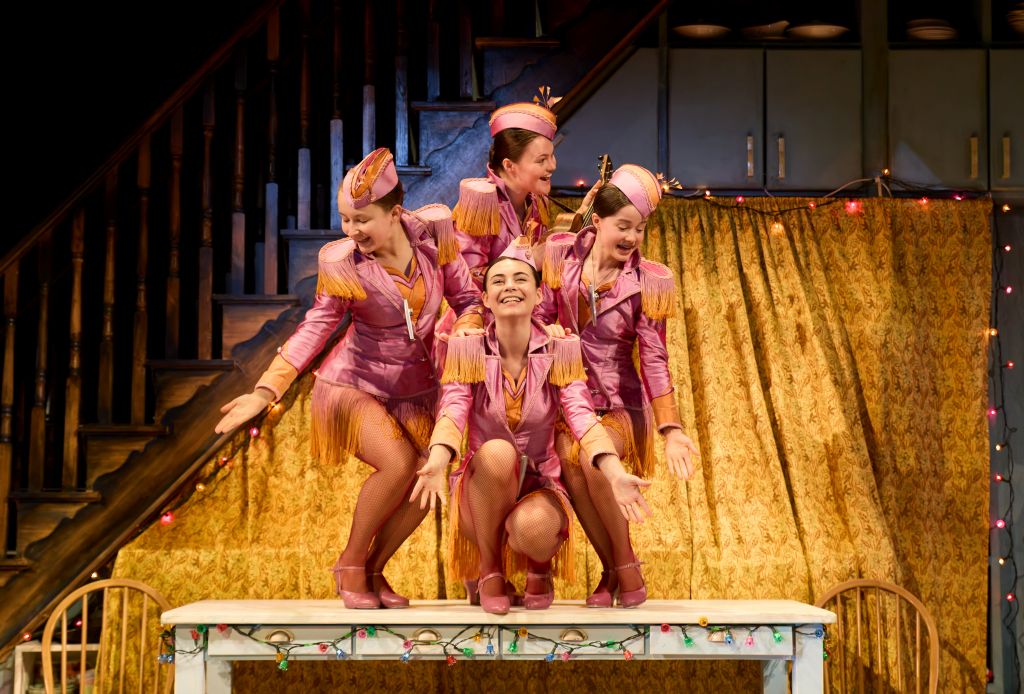Art makes for unexpected bedfellows, and so it proves in Jez Butterworth's moving if meandering The Hills of California. Butterworth's first play in seven years owes a lot more to as unexpected a source as the musical Gypsy than it does to such previous successes from this same author as The Ferryman and his mighty Jerusalem.
Telling of the toxic legacy of a Blackpool stage mother, the play follows The Ferryman in granting pride of place to the inestimable Laura Donnelly (Butterworth's partner), and this dramatist's collaboration with his similarly Tony-winning director, Sam Mendes, offers the kind of box office catnip from offstage creatives that you don't often see anymore.
Donnelly plays a Blackpool equivalent to Gypsy's fearsome Momma Rose, here a pathologically ambitious stage mom called Veronica who is busy corralling her four daughters into doing their best Andrews Sisters impersonation. Period music is pivotal to a play that takes its title from a Johnny Mercer song from the 1940s whose jauntiness is at purposeful odds with the actual terrain of the play. Disconnects exist elsewhere as we soon discover that the boarding house over which Veronica presides is called Seaview, despite not having one, and has rooms that boast American names - thereby only amplifying the sense of a better life elsewhere.
 Told in three acts, with an interval followed by a pause, the play starts with an ageing, ailing Veronica unseen upstairs. It's the brutally hot summer of 1976 and her daughters are gathering to say goodbye: ingredients for the sort of deathbed drama that has become a theatrical commonplace, except that we only ever see Veronica herself during flashbacks in her bustling, bristling prime. Eldest daughter Joan some years ago flew the nest, starting afresh in America and generating no small degree of nervousness amongst her siblings as to who will indeed come walking through the door. It's not until the third act - essentially an extended reminiscence, it's the weakest of the three - that we get an answer to that question via a doubling of roles to give Donnelly a real workout.
Told in three acts, with an interval followed by a pause, the play starts with an ageing, ailing Veronica unseen upstairs. It's the brutally hot summer of 1976 and her daughters are gathering to say goodbye: ingredients for the sort of deathbed drama that has become a theatrical commonplace, except that we only ever see Veronica herself during flashbacks in her bustling, bristling prime. Eldest daughter Joan some years ago flew the nest, starting afresh in America and generating no small degree of nervousness amongst her siblings as to who will indeed come walking through the door. It's not until the third act - essentially an extended reminiscence, it's the weakest of the three - that we get an answer to that question via a doubling of roles to give Donnelly a real workout.
The ferret-like Jill (Helena Wilson) announces herself as a virgin and greets a motley array of relations come to pay final respects to mum. Amongst them are Ophelia Lovibond cast against type as the full-figured, excitable Ruby, who takes nine hours to get there, and Leanne Best as the feisty Gloria, who is regarded by at least one of her siblings as "fit as fuck" and careers into view with opinions on everything, and children in tow.
The men are variably jokey, feckless, or, in one defining instance, predatory, and that last aspect marks out the play's lengthy flashbacks, even as Veronica drives her eldest child, Joan (Lara Mcdonnell), directly into a sexual heart of darkness. Those sequences - with Corey Johnson as an agent with an agenda of his own - are quietly searing, and allow the expansive heights of Rob Howell's characteristically astonishing set to suggest some sort of otherworld from which people don't necessarily emerge unscathed.
The price of fame is one theme of the play; the shattering of dreams another, and the adult Joan's arrival brings with it a lippy reckoning with her past that doesn't entirely land. That said, Butterworth and Mendes here keep a complicated array of personages on full-throttle view before us, though without the barnyard creatures that have been known to pop up in Butterworth's plays before. And if his masterpiece, Jerusalem, can be seen as both a celebration and critique of the cult of charisma, The Hills of California examines the damaging hold that parents exert over children when the ambitions from one generation get channeled into a ruinous way forward for another.
The musicianship of the four youngsters (pictured above) is superb, and you sense once again Mendes's interest in the world of play-making that obviously informs his superlative work in the theatre-themed The Motive and the Cue across town. (Both Veronica and the agent suffer from motives that are fairly suspect.) But whereas that play ends in triumph with Richard Burton owning the stage as Hamlet, The Hills of California proffers a very real caveat. Success is a tonic, as the men behind a play fueled by its females well know, but it can come at a price that forever sears the soul. The melody may be catchy, as the title song is here, but don't be fooled: triumph knows a thing or two about tears.















Add comment